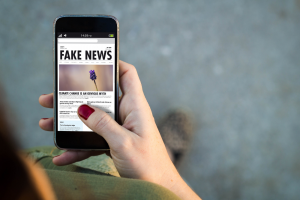Every January, global communications firm, Edelman, launches the Edelman Trust Barometer – the largest global survey on trust in business, government, media and NGOs. The survey gathers data from more than 33,000 people across 28 countries. It gives us a clear indication of how people perceive the stories they read and how messages from the government have been interpreted. We discuss the latest Trust Barometer findings on this week’s newly released podcast, which is all about Ethics in PR and can be found here.
2021 was undoubtedly a turbulent year in terms of coping with the pandemic as well as learning to adapt to the multiple rules the government had set out for us. Unsurprisingly, this provoked a clash of opinions and confusion about which guidance to follow.
Throughout this uncertainty, people naturally turn to trusted sources to find their information and to seek reassurance about important updates.
This year however, the report found that two-thirds (67%) of people globally said that they believe that journalists and reporters purposely try to mislead people by saying things they know are false or grossly exaggerated – an increase of eight percentage points on the company’s last report published in 2021.

Businesses, NGOs, government and media are all reported as failing to respond positively to the pandemic as well as climate issues. The government and media are said to be fuelling the ‘cycle of distrust,’ therefore threatening social stability as NGOs and business are pressured to take on the burden for societal problems that may well be beyond their abilities. Similarly, there is an increase in distrust in societal leaders with 66% saying they are convinced they’re being lied to by government leaders. In addition to this, 76% of people globally worry that fake news is being used as a weapon, which is a record figure. We talk about how to avoid getting caught up in this in our blog post ‘Take a stand and stop the spread of fake news.’
With societal leaders suspected of lies and misinformation, distrust in social media and a record low for confidence in journalists, it comes as no surprise that business is now the last remaining institution seen as being the most trustful source.

77% of people are said to put the most trust in their employers, and workers expect CEOs to be the “face of change”. This puts reliance onto businesses to step up and be aware of their accountability and purpose concerning all existential issues. Respondents want businesses to play a bigger role on climate change, economic inequality, workforce reskilling and racial injustice: “Every stakeholder group expects business to lean in, with nearly 60% of consumers buying brands based on values and nearly two-thirds of employees asking companies to take a public stand on issues.” This is something that we have discussed in a previous podcast from Season 1; ‘What is purpose and why should you care?’ In today’s age, consumers know that businesses are influential and have the power to help to change and shape the world around us, and with 90% of the public wanting to hear businesses speak up about big social issues, it’s time for companies to step up and have a view, something they may have shied away from in years gone by.
Companies generate trust when they perform well in the following areas:
- Working towards sustainable changes
- Relevant COVID-19 safety measures
- Listening to employees’ concerns
- Driving economic prosperity
Much akin to last year’s report, businesses will play a significant role in creating a sense of reassurance in such an unpredictable world climate. We are here to offer advice and help in terms of how you can prepare your business to be as proactive as possible to build a solid relationship with both employees and consumers. We’d love to know what you think about the findings from Edelman’s survey? Let us know at hello@adpr.co.uk and check out Episode 1 from Season 3 of our podcast, Revitalise & Grow, which is all about Ethics in PR.

